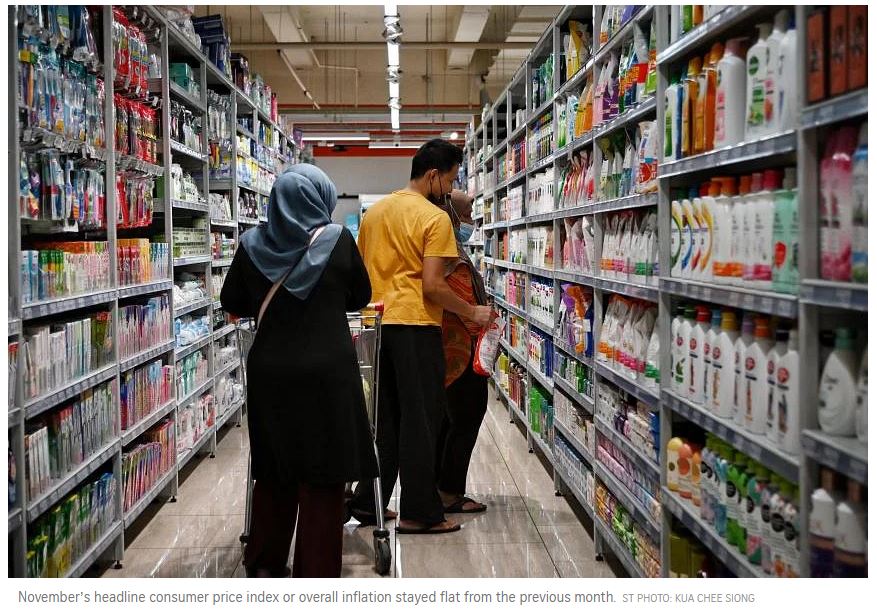Singapore core inflation unchanged in November at 5.1%
SINGAPORE – Core consumer prices in Singapore rose in November at a pace that was unchanged from the previous month.
Core inflation, which excludes costs of private transport and accommodation and reflects the expenses of Singapore households more accurately, came in at 5.1 per cent year on year. This was in line with the 5 per cent expected by analysts in a Bloomberg poll.
The figure was unchanged from October, which marked the first dip since February 2022 in what some economists said is a sign that inflation here may have peaked. September’s rate was 5.3 per cent.
Smaller increases in the costs of services, as well as electricity and gas, were broadly offset by a steeper pick-up in the costs of food, retail and other goods, the Monetary Authority of Singapore (MAS) and Ministry of Trade and Industry (MTI) said on Friday.
November’s headline consumer price index (CPI), or overall inflation, also stayed flat from the previous month, at 6.7 per cent, but it was slightly higher than the 6.5 per cent forecast by analysts.
MAS and MTI said that demand conditions in major economies have softened while supply chain frictions continued to ease.
Prices of energy and food commodities have come off the peaks reached earlier in 2022 but remain firm given ongoing supply constraints, they said.
“In addition, labour markets in major advanced economies are still tight, keeping wage pressures strong. Singapore’s imported inflation across a range of goods and services is expected to remain significant for some time,” said MAS and MTI.
Overall inflation is expected to average around 6 per cent for the full year, while core inflation is projected to come in around 4 per cent, unchanged from MAS’ October forecasts.
For 2023, the overall inflation forecast is also unchanged at between 5.5 per cent and 6.5 per cent, with core inflation between 3.5 per cent and 4.5 per cent. These estimates take into account the upcoming increase in the goods and services tax.
Across the categories, electricity and gas inflation fell the most, to 16.7 per cent in November, down from 19 per cent in October.
This was partly due to a higher base a year ago, when some households whose Open Electricity Market (OEM) retailers had exited the market were transferred to SP Group, said MAS and MTI. This contributed to a rise in electricity costs then as the regulated tariff charged by SP Group was generally higher than prices offered by OEM retailers.
Services inflation also eased, from 3.9 per cent in October to 3.6 per cent in November, owing to a smaller increase in airfares.
Accommodation inflation similarly edged down, from 4.9 per cent in October to 4.8 per cent the next month, as housing rents rose at a more gradual pace.
Private transport inflation slowed marginally, from October’s 17.3 per cent to November’s 17.2 per cent, in line with smaller increases in car and petrol prices.
But food inflation rose from 7.1 per cent in October to 7.3 per cent in November as the costs of food services rose at a faster pace.
The cost of retail and other goods also rose more sharply at 3.3 per cent, compared with 2.6 per cent in October, due to steeper increases in the prices of clothing and footwear, personal care products, and medicine and health products.
Core inflation is expected to stay elevated in the next few quarters before slowing more discernibly in the second half of 2023 as the tight labour market here eases and global inflation moderates, said MAS and MTI.
Labour costs are expected to increase further in the near term alongside robust wage growth, while the cost of utilities will probably remain high. Firms will likely pass import, labour and other business costs to consumers amid resilient demand, they said.
Increases in car and accommodation costs are also expected to stay firm in the upcoming quarters amid tight certificate of entitlement quotas for cars and strong demand for rental housing, they added.
Source: https://www.straitstimes.com/business/economy/singapore-core-inflation-unchanged-in-november-at-51


 Thailand
Thailand




